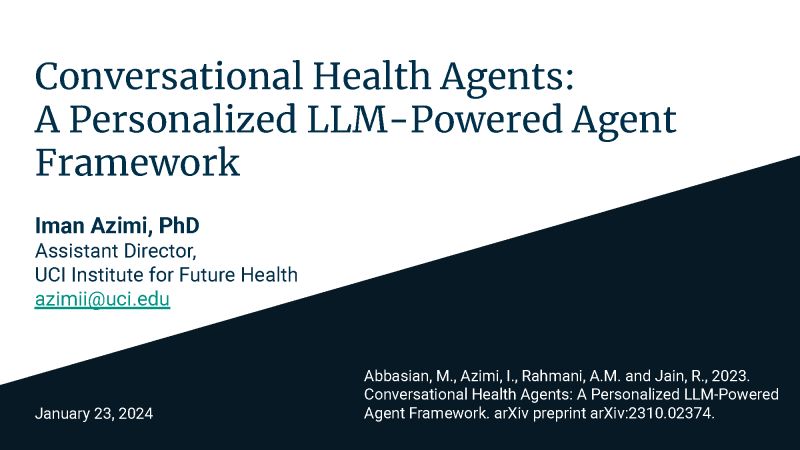Envision a groundbreaking healthcare app that could deliver hashtag#empathetic and hashtag#personalized responses to you! It could collaborate with reliable sources, your health data, and existing AI tools to solve complex health questions and guide you towards a healthy state. In pursuit of this vision, we developed and released hashtag#CHA as open source.We are seeking collaboration with individuals who share our passion for pushing the boundaries of healthcare technology. 💡 CHA: an LLM-powered framework for conversational health agents Stay tuned for more updates and examples that showcase the potentials of CHA. Should you be interested, please reach out to us at cha.framework[at]gmail[dot]com https://www.youtube.com/watch?v=rHXpk_P5n6Y
openCHA and interaction with wearable data
#openCHA and interaction with wearable data. This is an example of how the hashtag#openCHA framework enables the integration of patients’ data with hashtag#LLMs (via agents) to provide personalized responses. In this scenario, CHA has access to one-year data from multiple users, collected in 2020 via ŌURA rings. The users were asked to wear the rings continuously. In this example, three agents (i.e., tasks) were defined and connected to the Planner to 1) interact with local storage, 2) retrieve sleep data, and 3) perform basic analysis. The next questions delve deeper into the sleep parameters, querying if the parameters are enough. The responses provided are personalized, comparing the patient’s data against typical sleep norms. CHA utilizes both personalized data and general knowledge about sleep parameters to generate these responses. Stay tuned for more updates and examples. https://www.youtube.com/watch?v=PWxL_OgWGfE
chatbots
Can we rely on chatbots when seeking answers to our health-related questions? Current models attempt to answer health questions based on the vast amount of data they saw during their training phase. However, this alone is insufficient to ensure the accuracy of their responses. While GPT4 does a Bing search to support its responses, this is still not enough due to the large number of websites propagating false information. #openCHA can tackle this problem. How? openCHA uses hashtag#agents to gather information from reliable sources and generate responses. The framework offers the flexibility to choose the most appropriate local or online resources for such tasks. Therefore, the accuracy and reliability of the answers depend on the credibility of the sources we choose, rather than relying on LLMs or random Internet sources. The image shows a sample question regarding diabetes and the response from openCHA. In this example, openCHA retrieves the information using two agents: 1) to perform a search on reliable health websites and 2) to extract relevant data from these websites.
Workshop
I recently had the opportunity to give a talk at the Workshop on Interactive AI Systems for Digital Therapeutics, thanks to an invitation from Champalimaud Foundation Research Initiative on Digital Therapeutics, Lisbon, Portugal. It was an honor to present hashtag#openCHA, an open-source LLM-powered framework, designed to integrate health data, knowledge, and AI/analytical tools into healthcare chatbots. The workshop was an enriching experience, filled with insightful discussions, engaging interactions, and a chance to connect with experts and enthusiasts in the field. I was excited to gain insights from the diverse perspectives of other attendees regarding openCHA. openCHA is in its early stages, and we are eager to welcome contributions from a variety of communities: to contribute their ideas and integrate their already-developed tools and methods into this open-source framework.Looking forward to many more opportunities!
Imagine a health companion
Imagine a health companion that has the capability to analyze your health data and tailor recommendations specifically for you! As part of a Hackathon at the Workshop on Interactive AI Systems for Digital Therapeutics, Champalimaud Foundation, we were working on a project focused on developing a real-time photoplethysmography (PPG)-based stress estimation and recommendation agent.To accomplish this goal, we integrated openCHA with a PsychoBIT Kit equipped with a PPG sensor. The hashtag#openCHA framework allows LLMs to connect with external data sources, enabling the collection of information and the creation of customized responses.In our project, the integration was done by developing the following tasks and connecting them to openCHA. 1. A Python code to get the latest PPG data (captured by the PsychoBIT kit) stored on our laptop. 2. A Python function designed for PPG analysis, capable of extracting cardiac cycles and calculating the Root Mean Square of Successive Differences (RMSSD). 3. A guideline for interpreting RMSSD values to assess stress levels, categorized into normal, high, and very high. 4. An Internet search tool to retrieve stress-related information from online resources. Our chatbot successfully interfaced with the data gathered using the PsychoBIT Kit, analytical tools, and online resources, providing insights into our stress levels and delivering tailored recommendations (see images).Despite the project being developed during a single-day hackathon, we demonstrated the capabilities of openCHA and the potential of harnessing data from wearable devices to create personalized and context-sensitive recommendation systems. Special thanks to Mariana Duarte and Eric Lacosse.


